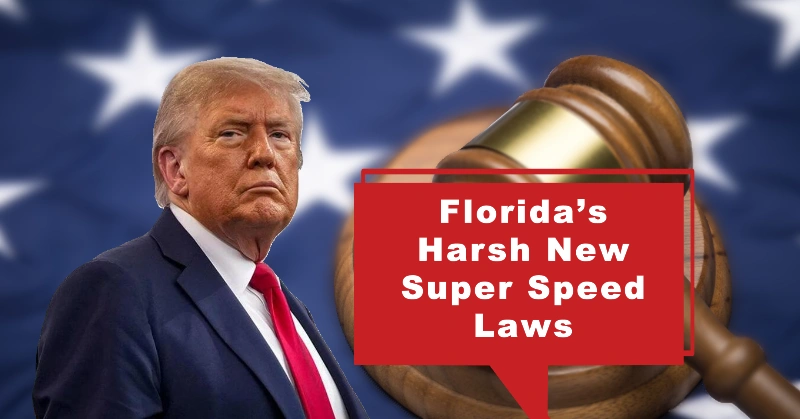Florida Drivers Face Major Consequences Under New Super Speed Law
A major crackdown on dangerous driving is coming to Florida as a strict new traffic law goes into effect on July 1, 2025. The legislation, dubbed the “Super Speed Law,” introduces some of the toughest penalties in state history for those caught driving more than 50 miles per hour over the posted speed limit.
This sweeping measure is the latest effort by Florida’s lawmakers to curb road fatalities and make highways safer for all. But it’s not just about fines—offenders now risk jail time and license suspension under this new policy.
Table of Contents
What the Super Speed Law Means for Drivers
Under the new law, if you’re caught driving 50 mph or more over the speed limit, the consequences are immediate and severe:
- First Offense:
- $500 fine
- Mandatory court appearance
- Up to 30 days in jail
- Second Offense (within 5 years):
- $1,000 fine
- Up to 90 days in jail
- License suspension for up to 12 months
Drivers cited under this law will no longer be able to simply pay a ticket and move on. They must appear before a judge, who will determine whether the situation warrants jail time or stricter penalties.
Minnesota New Major Law Changes Effective July 1, 2025: Driving, Traffic, and Tax Hikes Explained
The Tragic Case That Sparked the Law
The push for tougher laws came after the tragic death of 11-year-old Anthony Reznick, a young boy killed by a repeat speeding offender who had never served jail time. The incident sparked outrage and galvanized road safety advocates and families across Florida.
In response, the Department of Highway Safety and Motor Vehicles (DHSMV) worked with legislators to create a law that aims to hold reckless drivers accountable and prevent similar tragedies.
Why This Law Stands Out
Unlike previous laws that allowed high-speed offenders to simply pay a fine and move on, this law forces drivers to face a judge. According to the DHSMV, this is meant to “break the psychological impunity” where speeders feel untouchable after simply writing a check.
By requiring a court appearance and introducing the possibility of jail time—even for a first offense—the law hopes to deter dangerous behavior and shift the culture of driving in Florida.
Repeat Offenders Face Harsher Punishment
Drivers who are caught a second time will face much stiffer penalties, including:
- A doubled fine of $1,000
- Up to three months in jail
- Mandatory one-year license suspension
Judges will have broader discretion to impose strict consequences on those who continue to ignore the rules of the road.
Young Drivers in the Spotlight
The law is also a response to alarming statistics: drivers between ages 16 and 25 are consistently among the most frequent violators when it comes to extreme speeding. Officials hope this law will help instill safer driving habits early and make young drivers more aware of the risks they pose to themselves and others.
Revenue or Road Safety?
Critics of the law argue it may be more about generating revenue than improving public safety, but supporters point to results in other states. For instance, Georgia saw a 14 percent drop in speed-related deaths after enacting a similar policy.
Regardless of intent, the primary goal of Florida’s law is to save lives—especially in a state where more than 11 percent of traffic fatalities are linked to speeding.
TSA Warns Travellers to Rethink How They Handle Phones at Airport Security
What Drivers Should Do Before July 1
Nothing special is required—just stay aware of speed limits and adjust your driving accordingly. The law applies to everyone, including professional drivers such as truckers and ride-share operators. For those in licensed professions, a suspended license could also mean losing income or employment.
A New Era for Florida’s Roads
Starting July 1, driving in Florida enters a new chapter. The state is raising the stakes for reckless drivers with fines, jail time, and suspended licenses all now on the table. The message is clear: speeding no longer comes with a slap on the wrist.
So if you’re planning to hit the road, remember—getting there safely is more important than getting there fast. Florida’s roads are for everyone, and the goal is simple: get home alive.
